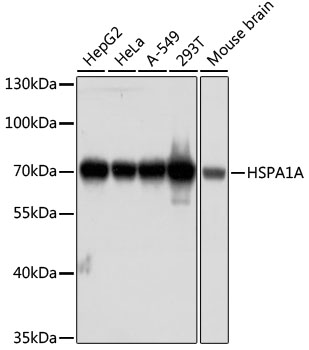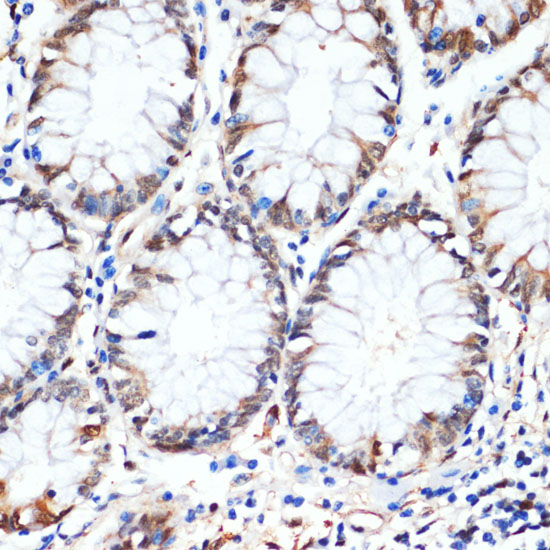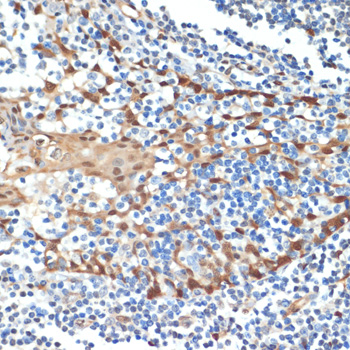Anti-HSPA1A Mouse Monoclonal Antibody (CAB1507)
- SKU:
- CAB1507
- Product type:
- Antibody
- Reactivity:
- Human
- Reactivity:
- Mouse
- Reactivity:
- Rat
- Host Species:
- Mouse
- Isotype:
- IgG
- Research Area:
- Immunology
Description
| 抗体名: | Anti-HSPA1A Mouse Monoclonal Antibody |
| 抗体コード: | CAB1507 |
| 抗体サイズ: | 20uL, 50uL, 100uL |
| 申し込み: | WB IHC |
| 反応性: | Human, Mouse, Rat |
| 宿主種: | Mouse |
| 免疫原: | A synthetic peptide of human HSPA1A |
| 申し込み: | WB IHC |
| 推奨希釈: | WB 1:2000 - 1:5000 IHC 1:50 - 1:200 |
| 反応性: | Human, Mouse, Rat |
| ポジティブサンプル: | HepG2, HeLa, A-549, 293T, mouse brain |
| 免疫原: | A synthetic peptide of human HSPA1A |
| 精製方法: | Affinity purification |
| ストレージバッファ: | Store at -20'C. Avoid freeze / thaw cycles. Buffer: PBS with 0.02% sodium azide, 50% glycerol, pH7.3. |
| アイソタイプ: | IgG |
| 順序: | Email for sequence |
| 遺伝子ID: | 3303 |
| Uniprot: | P0DMV8 |
| セルラーロケーション: | |
| 計算された分子量: | 70kDa |
| 観察された分子量: | 70kDa |
| 同義語: | HSPA1A, HEL-S-103, HSP70-1, HSP70-1A, HSP70.1, HSP70I, HSP72, HSPA1, HSP70 |
| バックグラウンド: | This intronless gene encodes a 70kDa heat shock protein which is a member of the heat shock protein 70 family. In conjuction with other heat shock proteins, this protein stabilizes existing proteins against aggregation and mediates the folding of newly translated proteins in the cytosol and in organelles. It is also involved in the ubiquitin-proteasome pathway through interaction with the AU-rich element RNA-binding protein 1. The gene is located in the major histocompatibility complex class III region, in a cluster with two closely related genes which encode similar proteins. |
| UniProt Protein Function: | HSP70: a critical chaperone protein that has a high affinity for unfolded polypeptide chains. It binds extended peptide segments with a net hydrophobic character exposed by polypeptides during translation and membrane translocation, or following stress-induced damage. In cooperation with other chaperones, hsp70 stabilizes preexistent proteins against aggregation and mediates the folding of newly translated polypeptides in the cytosol as well as within organelles. Mitochondrial HSP70 is crucial to the import process: mutant forms of HSP70 fail to import precursor proteins. Is anti-apoptotic in sympathetic neurones and mediates this effect primarily by suppressing c-Jun transcriptional signalling. Interacts with tau protein and mediates proper folding of tau. Can promote the degradation of tau protein. Triptolide, a potential therapeutic agent for progression/metastasis of pancreatic cancer, causes pancreatic cancer cell death by induction of apoptosis, an effect mediated by the inhibition of HSP70. |
| UniProt Protein Details: | Protein type:Chaperone; Heat shock protein; Motility/polarity/chemotaxis Chromosomal Location of Human Ortholog: 6p21.33 Cellular Component: centriole; centrosome; cytoplasm; cytosol; endoplasmic reticulum; extracellular region; focal adhesion; inclusion body; mitochondrion; nuclear speck; nucleoplasm; nucleus; perinuclear region of cytoplasm; ribonucleoprotein complex; ubiquitin ligase complex; vesicle Molecular Function:ATP binding; ATPase activity; ATPase activity, coupled; cadherin binding; denatured protein binding; enzyme binding; G-protein-coupled receptor binding; heat shock protein binding; histone deacetylase binding; protein binding; protein N-terminus binding; receptor binding; RNA binding; ubiquitin protein ligase binding; unfolded protein binding Biological Process: activation of NF-kappaB transcription factor; ATP metabolic process; chaperone-mediated protein complex assembly; mRNA catabolic process; negative regulation of apoptosis; negative regulation of cell growth; negative regulation of cell proliferation; negative regulation of protein ubiquitination; negative regulation of transforming growth factor beta receptor signaling pathway; neutrophil degranulation; positive regulation of interleukin-8 production; positive regulation of proteasomal ubiquitin-dependent protein catabolic process; protein refolding; protein stabilization; regulation of mRNA stability; regulation of protein ubiquitination; response to unfolded protein |
| NCBI Summary: | This intronless gene encodes a 70kDa heat shock protein which is a member of the heat shock protein 70 family. In conjuction with other heat shock proteins, this protein stabilizes existing proteins against aggregation and mediates the folding of newly translated proteins in the cytosol and in organelles. It is also involved in the ubiquitin-proteasome pathway through interaction with the AU-rich element RNA-binding protein 1. The gene is located in the major histocompatibility complex class III region, in a cluster with two closely related genes which encode similar proteins. [provided by RefSeq, Jul 2008] |
| UniProt Code: | P0DMV8 |
| NCBI GenInfo Identifier: | 825168577 |
| NCBI Gene ID: | 3303 |
| NCBI Accession: | P0DMV8.1 |
| UniProt Secondary Accession: | P0DMV8,P08107, P19790, Q5JQI4, Q5SP17, Q9UQL9, Q9UQM0 B4E3B6, |
| UniProt Related Accession: | P0DMV8 |
| Molecular Weight: | 70kDa |
| NCBI Full Name: | Heat shock 70 kDa protein 1A |
| NCBI Synonym Full Names: | heat shock protein family A (Hsp70) member 1A |
| NCBI Official Symbol: | HSPA1A |
| NCBI Official Synonym Symbols: | HSP72; HSPA1; HSP70I; HSP70-1; HSP70.1; HSP70-1A; HEL-S-103 |
| NCBI Protein Information: | heat shock 70 kDa protein 1A |
| UniProt Protein Name: | Heat shock 70 kDa protein 1A |
| UniProt Synonym Protein Names: | Heat shock 70 kDa protein 1; HSP70-1 |
| Protein Family: | Heat shock 70 kDa protein |
| UniProt Gene Name: | HSPA1A |




